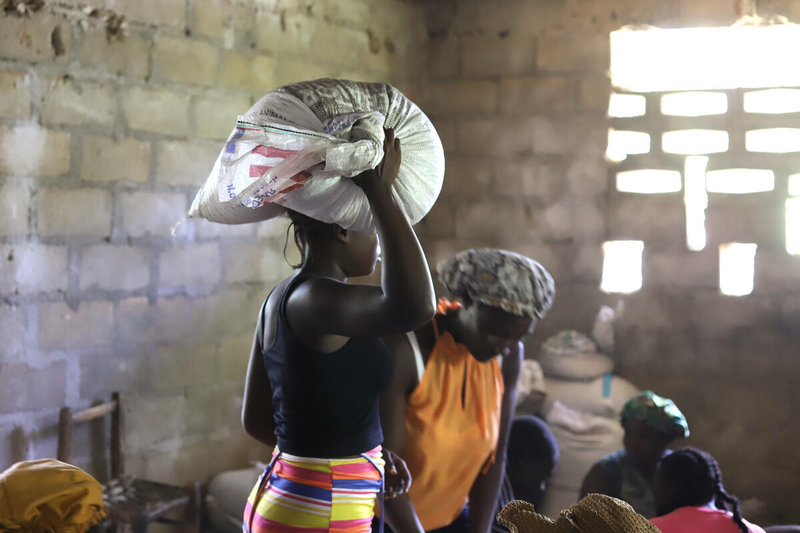Haiti: FAO and CERF launch emergency initiative to bolster rural food security amid climatic shocks, deportations and mass displacement
Cash, seeds, fodder, and training will save lives and help communities rebuild livelihoods

A woman carries a bag of seeds distributed by FAO in Perches, Haiti.
©FAO/Nour Azzalini
Port‑au‑Prince/Rome – The Food and Agriculture Organization of the United Nations (FAO) and the United Nations Central Emergency Response Fund (CERF), have launched an emergency initiative in Haiti’s North and Centre departments to deliver critical assistance to the most vulnerable and food-insecure households grappling with escalating displacement, a deportation crisis and worsening climatic shocks.
The initiative targets displaced persons, deportees from the Dominican Republic and communities hosting them, enabling families to produce their own food, while also boosting their resilience against recurring natural hazards.
This support comes at a critical moment. Nearly one in two Haitians is classified in IPC Phase 3 (Crisis) or above (Emergency or worse), according to the September 2024 Integrated Food Security Classification (IPC) analysis, with the vast majority living in rural areas relying on agriculture and livestock. This means families skip meals or eat less so they can get by, but still face food gaps and malnutrition risks, while others face extreme food shortages and are forced to take desperate measures just to survive.
Through CERF mechanism, the initiative will assist 1 500 vulnerable rural households — around 7 500 people — in displacement camps and families hosting deportees in the communes of Dondon, Plaine du Nord (North), Belladère, and Lascahobas (Center).
Key actions include:
- Emergency food production support: 1 200 rural households (6 000 people) are receiving nine tonnes of black beans, three tonnes of groundnut seeds adapted to dry conditions, and 600 000 elephant grass cuttings. These inputs are expected to generate over 250 tonnes of food within 90 days — enough to feed 8 000 households for six months – and improve dietary diversity. Families are also receiving unconditional cash transfers which enable them meet immediate food needs and avoid selling the agricultural inputs provided.
- Livelihoods rehabilitation: 300 people are restoring over 19 kilometers of non-functioning irrigation canals, bringing water back to between 100 and 300 hectares of farmland, and constructing 200 shelters designed to host and protect 1 200 goats or other small livestock. These works not only strengthen local production capacities, but also provide much-needed income opportunities, benefitting approximately 1 500 people across 300 households.
- Climate-smart agriculture training: 400 farmers will receive hands-on training in climate-smart agricultural practices and techniques that help boost productivity and adapt to the worsening climate crisis.
The targeted communes are among the hardest hit by overlapping climatic and social stressors. Belladère is a major entry point for more than half of all deportees from the Dominican Republic and hosts large numbers of internally displaced persons, while a recent surge of violence in the area of Lascahobas has further disrupted local markets and farming activities.
“In Haiti, emergency food production and preparedness for climate shocks is not just an immediate emergency response: it is the only effective way to generate lasting impact and empowerment in the lives of rural communities,” said Pierre Vauthier, FAO Representative in Haiti. “This emergency initiative helps address urgent needs while laying the groundwork for long-term disaster preparedness in local communities, enabling farmers to produce food, protect assets and adapt to a changing climate.”
By combining immediate assistance with long-term resilience-building measures, FAO and CERF are working hand in hand with rural communities to protect livelihoods, strengthen food security and lay the groundwork for recovery and stability.
Contact
Irina Utkina FAO News and Media (Rome) +39657052542 [email protected]
FAO News and Media (+39) 06 570 53625 [email protected]
